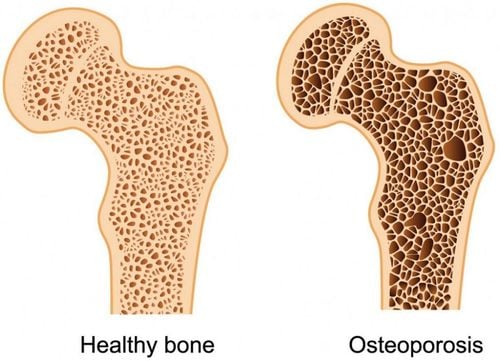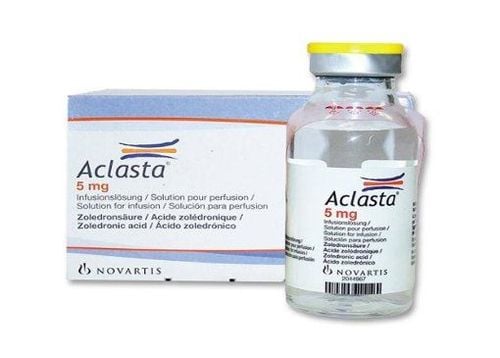This is an automatically translated article.
Arodrec belongs to the group of non-steroidal anti-inflammatory drugs (NSAIDs). Arodrec is indicated for the treatment of patients in a group at risk of fracture due to osteoporosis. The following article will provide detailed information about the uses of Arodrec.1. What are the uses of Arodrec?
Arodrec is an ETC drug - used in the treatment of osteoporosis in postmenopausal women and osteoporosis in men.
Main ingredients: Alendronate Sodium Trihydrate equivalent to Alendronic Acid 70 mg. Excipients: Anhydrous Lactose, Microcrystalline Cellulose, Starch Sodium Glycolat, Magnesium Stearate, Yellow Iron Oxide.
The drug is in the form of tablets. Tablets are long, biconvex, pale yellow, with grooves on the top and engraved AD70, smooth bottom.
2. Usage of Arodrec
2.1. How to take Arodrec The drug is taken orally. For easy absorption of Alendronate, it must be taken in the morning, with plenty of water (about 180-240 ml) and without mineral water. After taking the medicine, wait at least 30 minutes before eating, drinking or taking any other medicine, this will make Alendronate better absorbed. Even when taking the drug with orange juice or coffee, the absorption of Alendronate is significantly reduced. Do not lie down for at least 30 minutes after taking Alendronate to make it easier for the medicine to enter the stomach and reduce the risk of irritation and damage to the esophagus (inflammation, ulceration, erosion, perforation). Also, do not take Alendronate at bedtime or before getting up for the day. 2.2. Dosage of Arodrec Drugs for adults and the elderly with osteoporosis.
Treatment of osteoporosis for postmenopausal women and for men: 70mg/time/week. No dose adjustment is necessary for the elderly or for those with mild to moderate renal impairment (creatinine clearance 35 to 60 ml/min). Handling missed dose: If you forget to take a dose, take it the next morning when you remember. Do not take 2 doses in one day.
Treatment of overdose: Symptoms: Hypocalcemia, hypophosphataemia and undesirable reactions in the upper gastrointestinal tract such as stomach upset, heartburn, esophagitis, inflammation or gastric ulcer may be due to an overdose of Alendronate.
Solution: There is no specific information on the treatment of Alendronate overdose. Milk and antacids should be used to bind Alendronate. Due to the risk of esophageal irritation, vomiting should not be induced and the patient should remain upright. Dialysis is not effective.
3. Contraindications of the drug Arodrec
Esophageal anomalies leading to delayed esophageal emptying such as stricture or spasm of the esophageal sphincter. Hypersensitivity to any of the ingredients of the drug. Patients with upper gastrointestinal tract disease Hypocalcaemia. Severe kidney failure
4. Notes when using Arodrec
4.1. Precautions: Esophageal events, esophagitis, esophageal ulceration, and esophagitis, sometimes with bleeding, have been reported in patients treated with alendronate. In some cases, these events are severe, requiring hospitalization. Therefore, the patient must be alert to any signs or symptoms of an esophageal response (dysphagia, painful swallowing, or retrosternal burning).
The risk of serious esophageal complications is greater in patients who lie down immediately after taking Alendronate or do not swallow tablets with a full glass of water (180-240ml). Therefore, it is very important to provide complete instructions on drug use for patients to understand.
4.2. Pregnancy and breast-feeding Pregnant women: Alendronate can harm an unborn baby or a newborn baby. Cases of difficult parturition and incomplete ossification have been observed in animal studies. It cannot be ruled out that it may also be relevant to humans, so Alendronat should not be used during pregnancy.
Lactation: It is not known whether Alendronate is excreted in breast milk. Since many drugs are excreted in human milk, caution should be exercised when alendronate is administered to a nursing woman.
4.3. Effects of the drug on driving and using machines The drug can cause headaches, so caution should be exercised when driving or operating machinery.
5. Side effects of the drug Arodrec
In clinical studies, adverse reactions to alendronate were mild and generally did not require discontinuation. The rate of undesirable effects increased significantly in people treated with Paget's bone disease at a dose of 40mg/day, mainly adverse effects in the gastrointestinal tract.
Common:
Central nervous system: Headache, pain Gastrointestinal: Flatulence, acid reflux, esophageal ulcers, dysphagia, abdominal distension. Uncommon:
Skin: Rash, erythema (rare) Gastrointestinal: Gastritis . Once you know the information about the drug Arodrec, the patient should pay close attention to using it according to the manufacturer's instructions to achieve the best treatment effect. If you have any further questions, you can contact your doctor for answers.
Please dial HOTLINE for more information or register for an appointment HERE. Download MyVinmec app to make appointments faster and to manage your bookings easily.













